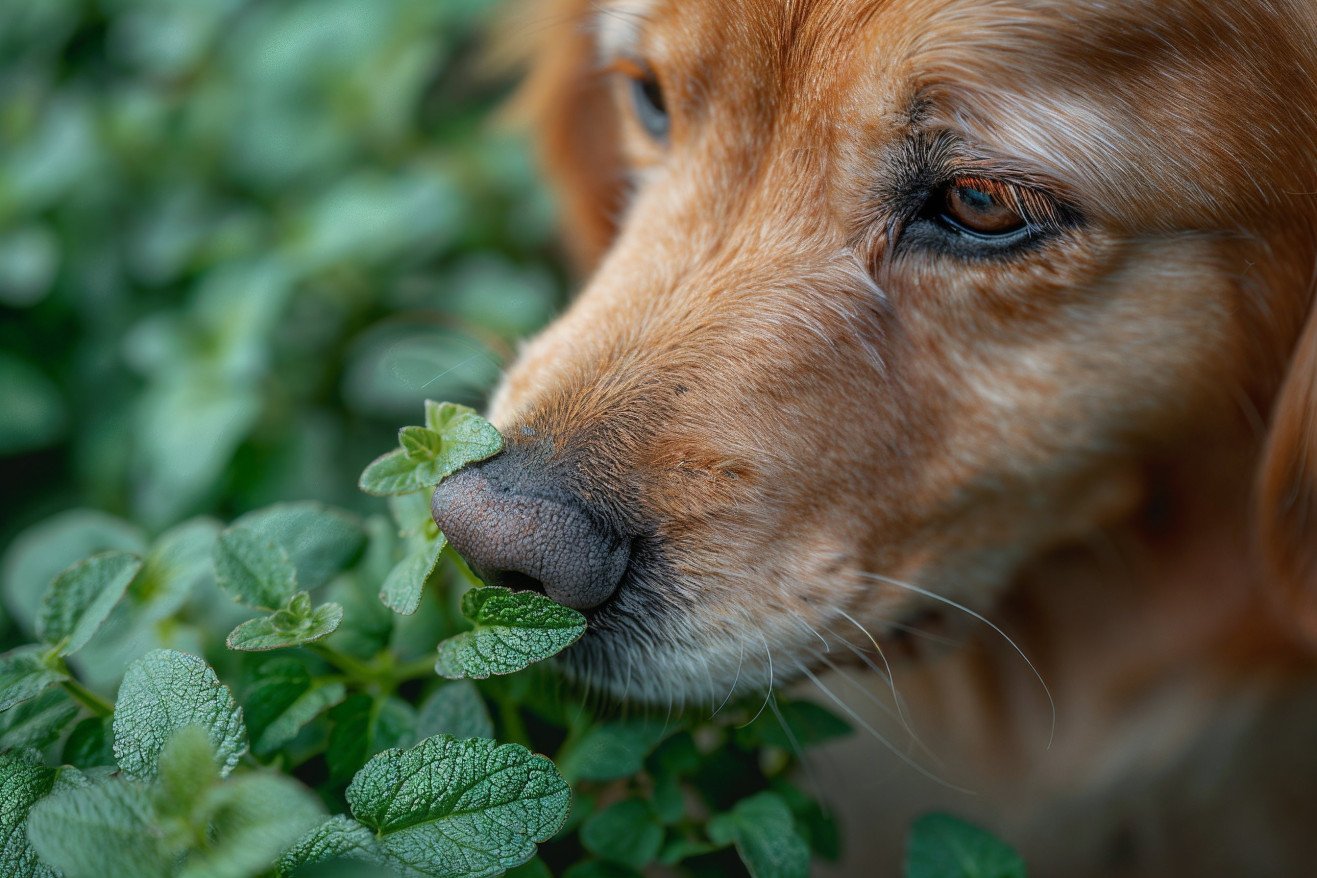Can Dogs Eat Oregano? A Scientific Look at the Herb's Safety
7 May 2024 • Updated 7 May 2024

With its rich taste and potential health benefits, you might want to give your dog a little bit of oregano. While oregano is not poisonous to dogs and can even be nutritious when used as a spice or supplement, it should be given in moderation because it can be too strong and even cause digestive upset in large amounts.
As with all herbs and spices, it's important to know the facts before giving them to your dog. This article will review the evidence from veterinary medicine, botany, and nutrition to determine if oregano is safe and healthy for dogs to eat. By learning about oregano's chemical properties and how they affect a dog's body, we can figure out how much dogs can have and if there are any risks to be aware of.
Can dogs eat oregano?
Nutritional Benefits and Potential Risks of Oregano for Dogs
Oregano is packed with vitamins A, C, and K, as well as omega-3s, calcium, iron, manganese, and fiber, per the Wishbone Pet Foods Blog. If eaten in small amounts, oregano can offer a number of health advantages for dogs. It’s known for its antibacterial, antifungal, and antiviral properties, which can help the body detoxify. Oregano is also an anti-inflammatory, which means it can help fight inflammation and arthritis by reducing pain and increasing mobility in the joints. And as an antioxidant, oregano can eliminate free radicals that can harm cells.
On the other hand, if oregano is consumed in large amounts, it can have negative side effects. Symptoms such as an upset stomach, vomiting, and diarrhea could mean your dog has ingested too much oregano. In addition, some dogs may be allergic to oregano, so it’s important to introduce it into their diet slowly and watch for any changes. It’s always best to talk to your vet about the right amount of oregano to give your dog since the appropriate dosage will depend on factors like their size, age, and health. If you use it in moderation and with the help of a vet, oregano can be a great supplement to your dog’s diet.
Oregano Poisoning in Dogs: Symptoms and Treatment
While oregano is safe for dogs to eat in small amounts, eating too much can result in oregano poisoning. WagWalking notes that symptoms of oregano poisoning in dogs can include vomiting, diarrhea, abdominal pain, hypoglycemia, bradycardia, and coagulopathy. In more serious cases, oregano poisoning can lead to bradycardia, hypotension, and gastrointestinal ulceration.
Treatment usually consists of decontamination and supportive care, and hospitalization is generally only required for severe cases. Preventive Vet suggests that pet parents can help prevent oregano poisoning by making sure to use the correct dosages and watching for any signs of an adverse reaction in their dog. With knowledge of the dangers and the right safety measures, oregano can be a healthy addition to your dog's diet.
How to Give Your Dog Oregano: Tips and Recipes
You can add fresh or dried oregano to your dog's regular meals as a seasoning or supplement. Rainbow Gardens explains that oregano typically grows 12-18 inches tall and prefers full sun and well-draining soil. To get even more out of the herb, you can also make oregano tea or add a few drops of oregano essential oil to your dog's food or water.
If you're planning to add oregano to your dog's diet, make sure to start with small amounts and work your way up to the recommended serving size based on your dog's weight and age. Just Raw Pet Food explains that you should always introduce herbs and spices to your dog's diet slowly, as many can cause side effects if they're consumed in large amounts. You can also mix oregano with other dog-friendly herbs, such as parsley and basil, to give your dog more nutritional benefits and flavor options.
Before you make any changes to your dog's diet, make sure to talk to your vet, especially if your dog has any pre-existing health conditions. Dog Cancer explains that oregano isn't safe for pregnant dogs or dogs with diabetes, and it should be stopped before any surgeries.
Fresh vs. Dried Oregano: Which Is Best for Dogs?
While both fresh and dried oregano are safe for dogs, there are some differences between the two. Animal Wellness Magazine explains that fresh oregano has a stronger taste and smell, which means that some dogs may be more or less likely to eat it. Meanwhile, dried oregano has a longer shelf life and is easier for pet parents to add to their dog's diet.
If you decide to use dried oregano, it's important to make sure that it's been properly dried and stored so that it retains its nutritional value and flavor. BeChewy also recommends that pet parents work with a pet nutritionist or pet nutrition company to make sure that they're using spices and herbs correctly, including making sure that they're giving their dogs the right amount.
In the end, whether you choose fresh or dried oregano will depend on your dog's preferences and your ability to store and use the herb. However, by learning about the benefits and drawbacks of each, you can make an educated decision about how to safely add oregano to your dog's diet.
Oregano Essential Oil: Benefits, Uses, and Risks
Oregano essential oil is an oil that is extracted from the oregano plant and contains the active ingredient carvacrol, which is an antimicrobial and antifungal. Dogs Naturally Magazine says that oregano essential oil can be helpful in treating a number of issues in dogs, including skin problems, ear infections, and growths, when it is used correctly and with the help of a professional.
That said, oregano essential oil is strong and can cause skin irritation and other problems if it isn't diluted correctly. Great Pet Care also warns that oregano essential oil should not be used in dogs that are prone to seizures, as well as in pregnant and nursing dogs, very old and very young dogs, and dogs with certain medical conditions or that are taking certain medications.
Because of these risks, pet owners should only use oregano essential oil under the guidance of a vet and should look for oils with a carvacrol content of 60-75%. Great Pet Care also says that pet owners should work with a professional to make sure that the oil is diluted and applied correctly.
Oregano Oil as a Natural Flea and Tick Repellent for Dogs
Oregano oil has even been researched for its potential as a natural flea and tick repellent for dogs. Healthy Dog For Life explains that the active compounds in oregano oil, particularly carvacrol and thymol, have been shown to have insecticidal effects against a number of tick species. In addition to repelling pests, oregano oil's anti-inflammatory and antimicrobial effects can help with skin issues that arise from flea and tick bites.
That said, a study in Science Direct points out that more research is needed to determine the long-term efficacy and safety of using oregano oil as a flea and tick repellent for dogs. Like with other essential oils, it's important to dilute oregano oil properly and use it in a way that minimizes the risk of an adverse reaction or skin irritation.
Conclusion: Use Oregano in Moderation for Healthy Dogs
Oregano can be a safe and beneficial addition to a dog's diet when used in moderation and under the guidance of a veterinarian. The herb has a number of potential health benefits, including anti-inflammatory, antibacterial, and antifungal properties. However, overconsumption of oregano can lead to digestive issues and, in severe cases, oregano poisoning.
Pet owners should carefully monitor their dog's reaction when introducing oregano and adjust serving sizes accordingly. By understanding the proper usage and potential risks, oregano can be a valuable tool in supporting a dog's overall health and well-being.


